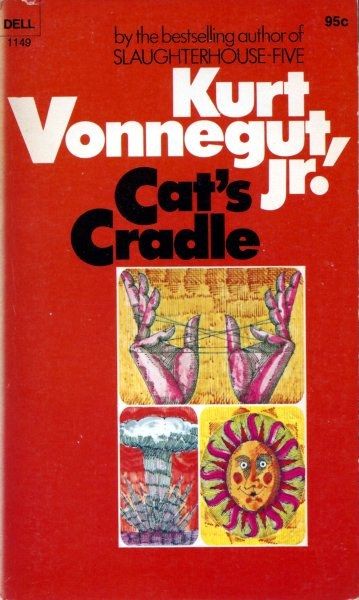Softly Falling
Cat’s Cradle
By Kurt Vonnegut, Jr.

2 Jul, 2023
Kurt Vonnegut, Jr.’s 1963 Cat’s Cradle is a stand-alone satirical science fiction novel.
Narrator Jonah1 has decided to write an account of the day the atom bomb exploded over Hiroshima (August 6th, 1945). His book is to be titled The Day the World Ended. His quest ultimately entangles Jonah with the Hoenikker siblings and places him in the middle of some momentous events.
Felix Hoenikker was one of the main architects of the atomic bomb; some called him the father of the bomb. By the time Jonah begins his project, Felix is dead. Jonah must settle for interviewing people who knew Felix: Felix’s co-workers and Felix’s children, Angela, Frank, and Newt. Only Angela and Newt are present to be interviewed, as Frank has vanished and may be as dead as Felix.
As some would have it, Felix was a kindly but unworldly genius who wouldn’t hurt a fly. But others saw him as a self-centered intellectual so completely focused on amusing himself with delightful mental challenges that he cared little how his discoveries might be used. From that POV, his attitude would best be described as depraved indifference.
Felix inadvertently left his offspring with one final discovery, Ice-Nine2. Ice-Nine is an allotropic form of water-ice, one stable at 45°C. Water cooler than 45 degrees transforms into solid Ice-Nine. Each of the three children has their own speck of Ice-Nine, each speck in a sealed container. Each speck has the potential to turn all the water on Earth to Ice-Nine, therefore it is of paramount importance that the specks remain in their containers.
A newspaper article reveals that Frank is alive and well; he is serving as the personal bodyguard of “Papa” Monzano, dictator of the Caribbean Island republic of San Lorenzo. Having located Frank, Jonah travels to the abjectly poor nation to interview Frank. Jonah is quickly drawn into island affairs.
Papa is dying. Frank, who traded his speck of Ice-Nine for his current position, is his designated successor. Frank does not want to be dictator. Therefore, he proposes that Jonah accept the position. Frank sweetens the deal by offering Jonah the hand of bewilderingly beautiful3 Mona. Besotted with Mona, Jonah accepts.
Before Jonah can take office, Papa must be buried. The funeral does not go quite as planned.
~oOo~
I read this book even though I had planned to read Player Piano. Because my Vonnegut volumes are stored on a low shelf and my eyesight is crap, I grabbed the wrong book.
It was my impression that SFdom had a strained relationship with Vonnegut because he insisted that his manifestly science fictional novels were not science fiction. I have no idea where I got that notion. Reviews by Orson Scott Card and Spider Robinson of later Vonnegut books are not positive, but Robinson at least referred to him as an author who used to be able to write effectively. There is no earlier book by Vonnegut whose reviews I could have plausibly encountered as a teen (I know I didn’t read the back issues in question).
The culprit may be the disparaging reference to Vonnegut in Niven and Pournelle’s Inferno:
A science-fiction writer who lied about being a science-fiction writer because he got more money that way. He wrote whole novels in baby talk, with sixth-grade drawings in them, and third-grade science, and he knew better. How does he rate a monument that size?”
One of Niven and Pournelles’ main peeves Vonnegut’s imaginary religion, Bokononism. It plays a prominent role in the novel. Bokononism is illegal on San Lorenzo and yet it is the dominant religion of the island nation. Invented out of whole cloth by Bokonon, its philosophy, the faith it inspires and the persecution it suffers is a charade intended to make the lives of the people of San Lorenzo less miserable. It is nonsensical but not necessarily valueless to its adherents. It is certainly better for the world than Ice-Nine.
Vonnegut’s views of scientists appear to have been shaped by contact with actual scientists during an early stage of his career, as well his having survived the destruction of Dresden during World War Two. He found the wholesale massacre of tens of thousands of civilians sufficiently disturbing as to distract from the marvelous technical and logistical achievements involved.
The novel combines a bleak view of humans as a whole with a not entirely unsympathetic view of the flawed individuals who comprise humanity. It’s an effective novel. It’s no surprise that SF fans chose it a finalist for the Hugo Award4.
Cat’s Cradle is available here (Amazon US), here (Amazon Canada), here (Amazon UK), here (Apple Books), here (Barnes & Noble), and here (Chapters-Indigo).
1: Jonah was apparently named John at birth. The narrator is not mentioned by name throughout most of the book.
2: The novel’s ice-nine is completely unrelated to actual ice nine. It’s probably best not to learn your science from Kurt Vonnegut books.
3: Mona is, to Jonah’s considerable distress, resolutely non-monogamous.
4: Cat’s Cradle lost to Way Station, and placed behind Glory Road, Witch World, and Dune World. That’s a pretty diverse lineup. No, I am not planning on rereading Glory Road just to add that final link.
